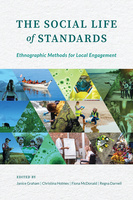Disability Injustice
Confronting Criminalization in Canada
In Disability Injustice, scholars and activists deliver a much-needed and long overdue analysis of disability and criminalization in Canada.
White Space
Race, Privilege, and Cultural Economies of the Okanagan Valley
White Space offers a compelling analysis of how whiteness sustains settler privilege and maintains social inequity in the BC interior.
Twice Migrated, Twice Displaced
Indian and Pakistani Transnational Households in Canada
Twice Migrated, Twice Displaced reveals the impact of discriminatory labour markets, precarious work, and transnational family relationships on Gulf South Asians in Canada.
Transformative Media
Intersectional Technopolitics from Indymedia to #BlackLivesMatter
In an era of social media dominance, Transformative Media reveals the often invisible, transformative media practices of marginalized groups.
Assisted Suicide in Canada
Moral, Legal, and Policy Considerations
Assisted Suicide in Canada provides an accessible, up-to-date introduction to this vitally important topic of ongoing public debate.
The Social Life of Standards
Ethnographic Methods for Local Engagement
The Social Life of Standards reveals how political and technical tools for organizing society are developed, applied, subverted, contested, and reassembled as local communities interact with standards created by external forces.
Frontiers of Feminism
Movements and Influences in Québec and Italy, 1960–80
Frontiers of Feminism shines new light on the recent history of feminist movements, using the examples of Italy and Québec to bring an international perspective to major themes, strategies, and modes of organizing.
Neighbourhood Houses
Building Community in Vancouver
Neighbourhood Houses documents how the neighbourhood house model, a century-old type of community organization, can help overcome isolation in urban neighbourhoods by creating welcoming places.
Activism, Inclusion, and the Challenges of Deliberative Democracy
Activism, Inclusion, and the Challenges of Deliberative Democracy investigates the failure of deliberative democracy to acknowledge the democratic contribution of activism, offering an alternative theoretical approach that makes a key distinction between contributing to and deliberating with.










